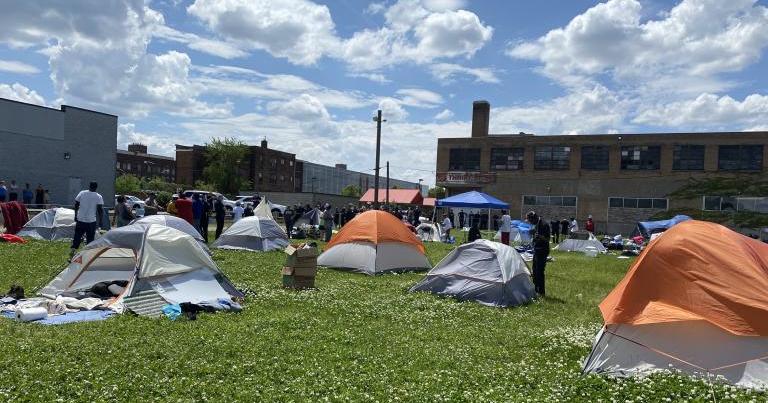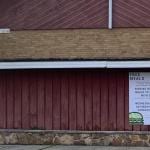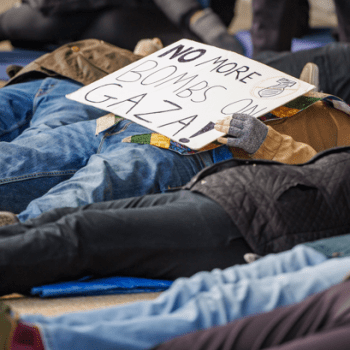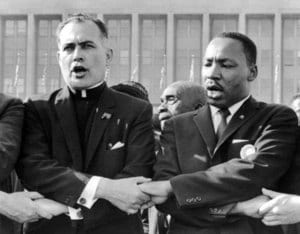“All in this together”? Policing and homelessness in South Bend, Indiana
David C. Cramer and Carrie Badertscher
“We are all in this together.”
It’s a phrase we hear often during this unprecedented time of crisis for our community. As pastors in South Bend’s Keller Park neighborhood, we have seen this phrase in action over the past few months, as our people have stepped up for those in need. After we converted our sanctuary into a food distribution center, we have seen congregants and neighbors give sacrificially to ensure that their neighbors—some of whom they have never met—do not go to bed hungry.

But on the afternoon of Tuesday, May 26, we were confronted with a question: Who counts as the “we” who “are all in this together”?
About a week earlier, we noticed an encampment of homeless neighbors near the corner of Michigan and South streets in downtown South Bend. The next day we took a hefty amount of leftovers to the encampment following our food distribution. By then the homeless residents had been forced to move across the street onto city property.
Over the course of the week, we took food to the encampment several times. Each time, we witnessed a group of people who know what it means to be “all in this together.” They took the food we brought to a centrally located table, where they distributed it in an orderly way to each person in need. They thanked us for the food and wished us God’s blessings and good health. Many of them wore masks to protect their neighbors from possible contagion.
Then on Tuesday afternoon, a congregant alerted us to news that South Bend Code Enforcement was forcibly evicting our new friends at the encampment. We quickly jumped in a van and raced to the site. When we arrived, we saw more police officers than homeless residents. We saw a bulldozer ready to level the encampment. We saw officers with what appeared to be rubber-bullet or paintball guns drawn. We heard the police chief threaten over a megaphone to open pepper spray on those who did not pack up their belongings and leave the property immediately, describing the extreme pain it would inflict on those who refused to leave. We heard nothing of alternative locations being offered by the city.
According to HUD’s 2019 report to congress, nearly 40,000 veterans experience homelessness in the United States—which means that after commemorating our fallen soldiers on Monday, by Tuesday afternoon we were telling their surviving comrades to pack up their belongings and get off our lawn.
While some of the homeless citizens grew understandably agitated by the extreme show of force, many of them peacefully explained to the officers that they simply had nowhere to go, as the shelters were full, and the city was offering them no other option. They explained that disbanding a group that was quite literally obeying the mayor’s recommendation to “shelter in place” would only increase the likelihood of contagion not only among the homeless community but also throughout the communities into which they would be dispersed. They were pleading for the officers’ own sake to allow them to remain sheltered in place.
The mayor later issued a statement declaring how “proud” he is “of how our men and women in the Department of Code Enforcement and Police Department took on this very difficult task.” Presumably this means that he approves of threatening to use bulldozers, riot weapons, and pepper spray on his own citizens—including veterans—who are peacefully sheltering in place in the middle of a pandemic.
Thankfully, a nearby church allowed the residents to move onto their property for the night—a short-term compromise to deescalate the situation and buy a little more time for a solution. Meanwhile, at Tuesday evening’s common council meeting, the mayor proposed using the old Salvation Army building for weather amnesty this winter. While this proposal is commendable, it still leaves our homeless residents without good options in the immediate future.
While the solutions to homelessness are as complex as its underlying causes, we cannot begin to address them meaningfully until we get clarity on one thing: these South Bend citizens are part of our collective “we.” They deserve to be treated with respect and dignity—and not with threats of force and violence.













